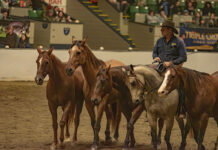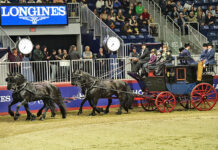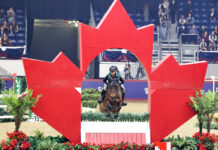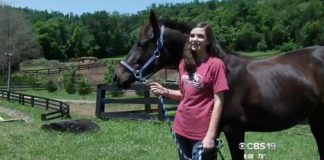 |
| Click for larger image. Jonathan Wentz and NTEC Richter Scale. Photo: Lesley Ward. |
The day started early at the 2010 Alltech FEI World Equestrian Games with the Grade II Individual Championship competitors trotting into the arena at 8.30 a.m. America was represented by Rebecca Hart riding her own Norteassa, a Hanoverian gelding, and Jonathan Wentz riding NTEC Richter Scale, a lovely 16-year-old Shire cross owned by his trainer Kai Handt.
Hart was the highest placed American with a score of 63.6. She was born with familial spastic paraplegia, a genetic disease that causes muscle wasting and a lack of control from the waist down. Hart is the most experienced international member of the United States team having competed at the 2008 Paralympics in Hong Kong where she placed fourth individually.
At 20, Wentz is the youngest member of the United States para-equestrian team. He’s currently a sophomore at Southern Methodist University in Texas and is studying history, economics and political science.
Wentz has had cerebral palsy since birth and he began riding when he was two years old for therapy to strengthen his coordination, flexibility and balance. It wasn’t long before Wentz was a pro at vaulting, jumping and western pleasure. At 13, he was told that his legs were too weak for jumping so he decided to focus on dressage. One year later he competed in his first able-bodied class at a USDF recognized show.
Wentz was fairly pleased with his test.
“The test was pretty good,” he said afterwards. “My goal was really to get more movement at the walk than I had on my last test. I think it was the best test Richter has ever done at a show. He’s really the perfect horse for me. He does his job and is perfectly happy to help me out.”
Wentz admitted to being nervous before the test.
“It’s a bit different to be riding in front of five judges.”
Wentz has been aiming for the World Equestrian Games for years.
“I was riding at a therapy center and I realized that I would have to compete in able-bodied classes to really get ahead. My next goal is London 2012 and this competition has been a good building block.”
Wentz had some advice for other para-equestrians.
“Just work hard. It’s not something you can do as a hobby. Just like an able-bodied person, you have to ride six days a week and have the help of a top trainer.”
The Brits stormed the next class, the Grade Ia Individual Championship, by winning first, second and third. This is a class in which the riders and horses perform different movements at the walk.
 |
| Click for larger image. Sophie Christiansen and Rivaldo. Photo: Lesley Ward. |
23-year-old Sophie Christiansen and Rivaldo of Berkeley won the class with a score of 76.1. Sophie has cerebral palsy which affects all of her muscles. She’s been zipping around the Kentucky Horse Park on an electric scooter because she can’t walk long distances.
When Christiansen was a schoolgirl, she was given the choice of therapeutic riding at the local Riding for the Disabled Association or physical education at her school. Loving horses, Sophie didn’t have to think twice before choosing riding.
Christiansen was thrilled with her score.
“If you want to achieve something, you go for it. It applies to everything really,” she said. “If I want something I go for it!”
Christiansen was looking forward to her freestyle performance.
“I like music in general. It relaxes me. I can follow the rhythm when I ride.”
Kim Decker was the only American in the Grade Ia championship. She rode her own Dashers Destiny, a super-cute Hanoverian gelding owned by Decker and her parents.
Decker suffered a traumatic brain injury in 1986, just weeks before her 18th birthday. She was comatose for more than three months after the accident. When she regained consciousness, she underwent years of physical therapy and eventually was able to return to her childhood passion—riding.
Decker finished up in 14th place with a score of 60.9. She was pleased with her horse’s performance.
“I thought he was really good. He felt like he was really on today,” said Decker. “He’s such a good boy every time I go into the ring. He’s so friendly. He loves everyone!”
 |
| Click for larger image. Lee Pearson and Gentleman. Photo: Lesley Ward. |
Always fabulous British rider Lee Pearson won yet another first place in the Individual Championship Grade Ib on his own Gentleman with a score of 76.4.
Despite having arthrogryposis, a muscle and joint disorder that causes him to walk with splints and use an electric scooter, back home in Cheddleton, Staffordshire, Pearson trains able-bodied riders and competes in able-bodied competitions.
Pearson was enjoying being at the games.
“It’s quite novel to be mixed in with all of the able-bodied riders,” he admitted. “I can’t believe how big para-equestrian has become. I think by London 2012, the quality of horses in the para-equestrian competition will be phenomenal.”
Pearson was looking forward to his freestyle performance on Saturday.
“I plan to show off in the freestyle. My music will be so loud that you won’t be able to hear all of the cameras clicking!”
For complete results, visit www.alltechfeigames.com/results
See all World Equestrian Games para-dressage news >>





